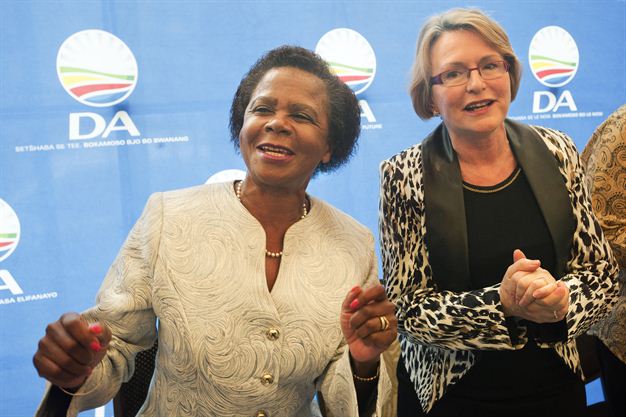South Africa’s leading opposition party, the Democratic Alliance (DA), stunned political observers Tuesday with the announcement that Mamphela Ramphele, a leading black anti-apartheid activist, will be the party’s candidate for president in national elections against the troubled African National Congress later this year. The DA, whose leaders have largely been white, has struggled for decades to appeal to the black majority of voters.
DA leader Helen Zille called Ramphele’s decision to join her party a “game-changing moment for South Africa.” The move is likely to boost the fortunes of the DA significantly, while setting aside the independent political ambitions of Ramphele. In 2013, Ramphele had led dissatisfied black voters out of the ANC in a new party, Agang (“Build”) that struggled to gain wide traction beyond its thin constituency within the new black middle class. The ANC is still widely expected to win the elections, albeit with a significantly reduced majority.
The two are linked by more than opposition politics. Ramphele was romantically involved with Steve Biko, the Black Consciousness movement leader killed by the apartheid regime in the 1970s, and had a child with him. Zille was the journalist who broke the story of Biko’s death in police custody in 1977, causing a national outcry.
The center-right DA has its roots in the sole white anti-apartheid party, the Progressive Party. It was led to prominence by Tony Leon from 1994 to 2007 before Zille was elected party leader. Zille has carried the DA to victory in the Western Cape province and worked to grow the party’s support beyond its traditional base among whites and other racial minorities. Surveys suggest black voters like the DA but are not yet ready to trust it.
Ramphele’s decision to join the party may begin to change that. She will be the third black leader atop the party, including Cape Town mayor Patricia de Lille, a former Pan Africanist Congress figure, and parliamentary leader Lindiwe Mazibuko. However, Ramphele’s appeal is primarily among the black business and professional elite–which remains skeptical of the DA–and she may not attract a large number voters from South Africa’s poor.
Regardless, the decision is significant. South African elections typically offer few surprises, since votes are cast largely along racial lines. In the post-Mandela era, however, with political loyalty to the ANC continuing to fall, that pattern may begin to change. Though the DA acknowledges that it may struggle to win a national majority for a long time, in the near future it hopes to be the kingmaker in elections in which no party has a majority.

COMMENTS
Please let us know if you're having issues with commenting.